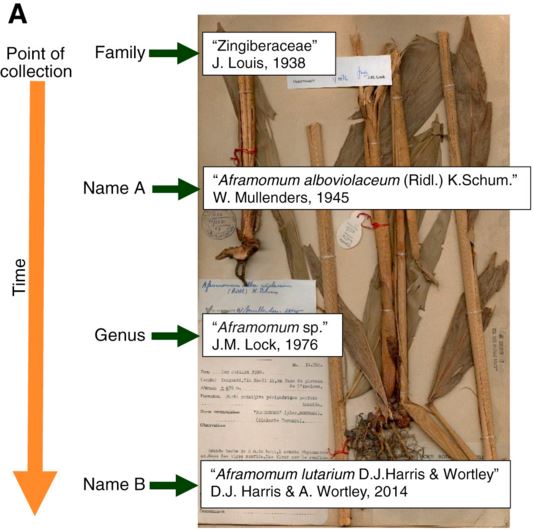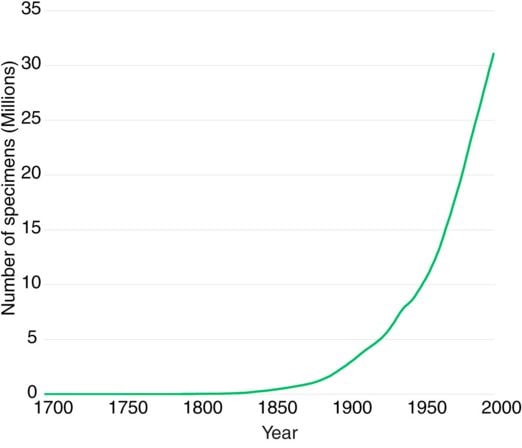At least half of all tropical plants are wrongly named, a new study has found, partly because the number of new specimens collected over the past 50 years has increased overwhelmingly. However, it is a widespread problem that needs to be addressed.
Scientists from the Department of Plant Sciences at the University of Oxford and the Royal Botanic Garden Edinburgh wrote about this ‘big problem’ in the academic journal Current Biology.
The primary way that scientists know anything about the distribution of animal and plant species in the natural world is through the specimen collections kept in the thousands of museums across the world.
 When this plant was collected in 1938, it was identified to family, as Zingiberaceae, by J. Louis. In 1945, it was identified as Aframomum alboviolaceum (Ridl.) K.Schum. by W. Mullenders. In 1976, it was recognized as not fitting any existing species concepts and re-identified as Aframomum sp. In 2014 the plant was recognized as a new species, Aframomum lutarium D.J.Harris & Wortley, by Harris & Wortley. (Image: Current Biology)
When this plant was collected in 1938, it was identified to family, as Zingiberaceae, by J. Louis. In 1945, it was identified as Aframomum alboviolaceum (Ridl.) K.Schum. by W. Mullenders. In 1976, it was recognized as not fitting any existing species concepts and re-identified as Aframomum sp. In 2014 the plant was recognized as a new species, Aframomum lutarium D.J.Harris & Wortley, by Harris & Wortley. (Image: Current Biology)
Consequently, huge effort is being put into adding data on all these collections into free and accessible databases, such as the Global Biodiversity Information Facility (BDIF).
However, Dr. Robert Scotland, Reader in Systematic Botany at the University of Oxford’s Department of Plant Sciences, and colleagues say they have uncovered a ‘big problem’ – among collections all over the world, mistaken identity is ‘incredibly common’, especially among tropical plants.
Half of tropical specimens wrongly named
Over the past four decades, plant collections globally have more than doubled, but over half of all tropical specimens, on average, are probably named incorrectly, the authors suggest.
Dr. Scotland said:
“Part of the reason for such rampant misidentification is the huge increase in the number of specimens which have been collected in the last 50 years.”
“The other reason is the lack of expertise in many tropical plant groups. This produces a situation where huge numbers of incoming specimens can overwhelm any efforts to identify them by the few people with the necessary skill.”
 From 1700 to 2000, a total of 31,068,510 plant specimens were registered in herbaria. Half of them were collected from 1969 to 2000. (Image: Current Biology)
From 1700 to 2000, a total of 31,068,510 plant specimens were registered in herbaria. Half of them were collected from 1969 to 2000. (Image: Current Biology)
58% of African gingers wrongly named
The authors checked 4,500 specimens of African gingers from forty herbaria in 21 countries to evaluate the accuracy of names.
Their data showed that at least 58% of the specimens they checked had the wrong name prior to a recent taxonomic study.
They also detected a similar pattern of incorrectly named specimens for Dipterocarps and Ipomoea (morning glory).
This discovery will have scientists and students wondering how to use specimen data sourced from those natural history collections.
Solution is the price of Lionel Messi
However, the authors believe there is a solution to the problem.
It currently costs about $750 to revise a species. If the amount of money it would cost for, say, Manchester United to buy Barcelona’s superstar Lionel Messi, were spent on naming all the plant species, the job could be completed, and accurately, Dr. Scotland emphasized.
The authors say they are currently doing their part by trying to find new integrated approaches to taxonomy (the classification of living things).
They have combined their techniques into what they call ‘foundation monographs’, and are starting off with two plant groups.
Dr. Scotland said:
“We know so little about the natural world, but we still have a chance to document it properly.”
Citation: “Widespread mistaken identity in tropical plant collections,” Zoë A. Goodwin, David J. Harris, Denis Filer, John R.I. Wood, Robert W. Scotland. Current Biology. 16 November, 2015. DOI: DOI: http://dx.doi.org/10.1016/j.cub.2015.10.002.
